|
Versión en español
We must 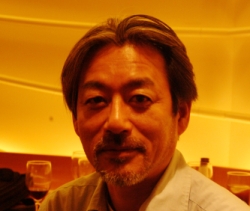 travel back to the eighties to meet the beginnings of music composer Shigeru Umebayashi, at the time he cofounded the successful rock group Ex, a real mass phenomena in his country, Japan. As the group broke up in 1985, Umebayashi then began his career as a movie music composer. Among his works, there are remarkable titles as And Then (Morita Yoshimitsu), The Christ of Nanjing (Tony Au), In the Mood for Love and 2046, both directed by Wong Kar-Wai, and the most recent one, The House of Flying Daggers, by Zhang Yimou. travel back to the eighties to meet the beginnings of music composer Shigeru Umebayashi, at the time he cofounded the successful rock group Ex, a real mass phenomena in his country, Japan. As the group broke up in 1985, Umebayashi then began his career as a movie music composer. Among his works, there are remarkable titles as And Then (Morita Yoshimitsu), The Christ of Nanjing (Tony Au), In the Mood for Love and 2046, both directed by Wong Kar-Wai, and the most recent one, The House of Flying Daggers, by Zhang Yimou.
BSOSpirit (BS): First of all
thank you very much for this interview. It’s a great honor for us. Let’s
talk about your beginnings. You were in touch with new wave rock world
with “EX” group.
Why did you leave this world to begin in soundtracks?
Shigeru Umebayashi
(UME): First of all, I feel so lucky and honored to have worked
with many remarkable movie directors. Composing film music is another way
of expressing my music, but it doesn’t mean that I have detached
my passion over rock music. If I may have the opportunity, I’d like
to release a rock music solo album.
BS: You are known in industry as your alias “UME” because of your surname and your second CD called “UME”. What can you tell us about this work?
UME: During that period of time, I’ve made a contract with JVC, and releasing a solo CD album was part of our deal. I’ve always wanted to collaborate with Georg Kajanus, who is a member of a British Band called “Sailor”, and I had him come over to Tokyo to take part in the first 2 songs of the 1st album.The 2nd album, I flew to London and did our recording there. When it was time to name my album, it was Georg who threw the idea to name the album “UME”. Though the sells of the album was not that successful, I had a wonderful 3 months working with Georg.
BS: 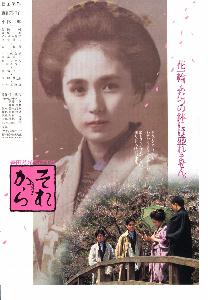 How was your beginnings with films like Itsuka darekaga korosareru, Tomo yo shizukani nemure and Sorekara? How was your beginnings with films like Itsuka darekaga korosareru, Tomo yo shizukani nemure and Sorekara?
UME: In the mid 80’s, film industry in Japan was reaching its turning point. As I had a number of rock music albums released, an actor Yusaku Matsuda (performed Black Rain directed by Ridley Scott) was getting well-known in Japan. Because I was given the chance to produce Mr. Matsuda, this fact opened many doors to meet people from the film industry. New generation movie directors were taking film music very seriously, and they were hungry for new style of music. Luckily, my way of writing music was welcomed to their ideas and warmly accepted to this change. During this time, I was still a guitarist of my band called “EX”.
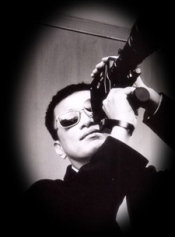
BS: Press and occidental public gave you their support from your collaboration with Kar Wai Wong in Fa yeung nin wa (AKA In the Mood for Love), but they forgot that you realized more than 20 works then. Fuyajo, Nan Jing de ji du, Tokarefu were some of the most important ones til Fa Yeung nin wa. Which are your favorites works at this time?
UME: Please know that I’m a man who does not stop to love. This question to me is like answering to a difficult question like, “Who is the only woman you’ve ever loved?”. Forgive me; I have no answer to this question.
BS: Let’s talk about your fruitful relationship with Kar Wai Wong. How did it begin? Which are your best remembrances about your artistic relationship with him?
UME: Through a Hong Kong friend of mine, I’ve met Mr. Wang, approximately 8 years ago. As much as I liked his work, he too, was very fond of my film music. Ever since then, we had both hoped to collaborate one day in the near future. And what’s wonderful about our relationship was that, when viewing things in an artistic manner, he and I need no words in between to communicate; we were gifted to feel the same.
BS: 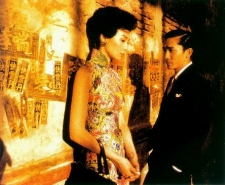 What did suppose for you as musician to do the score of Fa yeung nin wa (AKA In the Mood for Love)? What did suppose for you as musician to do the score of Fa yeung nin wa (AKA In the Mood for Love)?
UME: 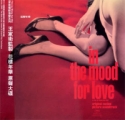 The main theme film music for “Yumeji’s Theme” was originally made as one of the film song of “YUMEJI” which was directed by Seijun Suzuki as a Japanese film. Back then, this music was not accepted to play an important role in the movie, until Wang Kar Wai saved the spirit of this music by utilizing my song in his film. Until this day, I still owe him my great appreciation. The main theme film music for “Yumeji’s Theme” was originally made as one of the film song of “YUMEJI” which was directed by Seijun Suzuki as a Japanese film. Back then, this music was not accepted to play an important role in the movie, until Wang Kar Wai saved the spirit of this music by utilizing my song in his film. Until this day, I still owe him my great appreciation.
BS: What main differences do you find between this score and 2046?
UME:As for 2046, composing an original score was already misinterpreted from the beginning. For 3 years, I’ve seen fragments of the film, but I’ve started to write my score only a month before the final mixing. From watching the screen, people must view 2046 as an extension of In The Mood For Love, but I had them totally separated in my mind when I composed them.
 BS: In 2046 we can find music from other composers like George Delerue or Zbigniew Preisner. Why did you use this compositions and not other composed by you?
UME: Please have Mr. Wang answer this question.
BS: The violin is very important in this soundtrack but we find an important and retentive main theme near to rumba or jazz style or a more classical way. How do you maintain the coherence in a composition that travel across so different styles?
UME: All the songs from the Beatles, for instance, they have different styles of music and yet they are all known as the Beatles’ music. As of me, I always try to listen to different variety of music and relate to them as much as possible. Different style and different texture of music attract me very much. And being a composer, I should be able to adapt myself to all type of music; just like in the industry of fashion, cooking, architecture….etc, they all have different styles, and music is just the same. If we force ourselves to come up with something good, the chances are we often lack in something, whether that may be the passion. To me, Spanish music is a “heart-dancing music”. I admire Spanish music very much.
BS: 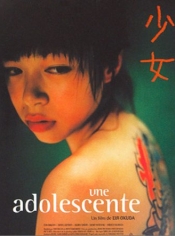 Shôjo is a delicate composition with remembrances from European music. Why did you approach yourself to this kind of music and why did you abandon your oriental music style? Shôjo is a delicate composition with remembrances from European music. Why did you approach yourself to this kind of music and why did you abandon your oriental music style?
UME: Ever since I was a little boy, I liked European movies. Perhaps the work that I do now some what reflects those films I’ve watched in my youth. But at the same time, I feel many of songs also have a taste of Asian music.
BS: Let’s talk about one of your best scores Zhou Yu de huo che (AKA Zhou Yu's Train). Although the score is very important in the film (more than actors’ interpretation) this CD is not edited. Why?
UME: Thank 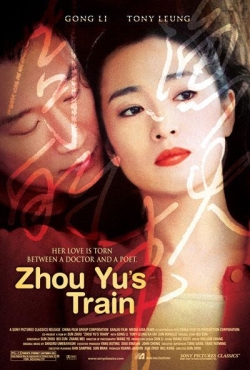 you very much. Not all of my score are included, but the CD which includes 10 songs has been released only in Japan. It would be my pleasure to send you one. you very much. Not all of my score are included, but the CD which includes 10 songs has been released only in Japan. It would be my pleasure to send you one.
BS: The natural elements are omnipresent in the history. The train crossing leafy forests, the river, the fog, etc... Did you use natural landscapes belonging to your own environment for inspiration?
UME: The image of natural landscapes was not as important when composing this piece. The woman Gong Li played as a role was very attractive to me. I felt that I wanted to express more freely with my music, but the movie director was unexpectedly conservative.
BS: The violin appears during all the history but when Gon Li has the empty look into the distance you introduce a great piano solo. This theme attracts listener attention a lot. How was this theme created? What were you trying to transmit? How important is the piano in this leitmotiv?
UME: I’d like to go through my music once again, but I believe I’ve never composed a piano solo.
BS: Zhou Yu of huo che it’s a film of enormous lyricism. What is easier for you when you are composing, to accept projects like this where poetic halo soaks all the history or you prefer other kind of projects where you lead this poetic halo with your music, something like a trunk that has to be perfectly carved?
UME: It is true that I like lyrical movies. And to me, I enjoy writing file music especially to those movies that does not need film music.
BS: 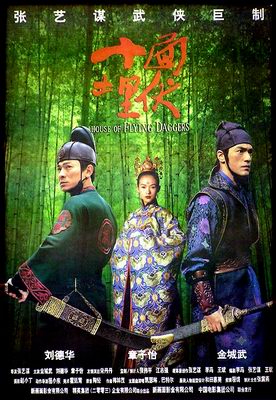 Now we’re going to talk about one of your greatest hit: your score for Shi mian mai fu (AKA House of Flying Daggers) directed by Zhan Yimou, a man that cares technical aspects like photography. What kind of suggestions did he give you to help you? Now we’re going to talk about one of your greatest hit: your score for Shi mian mai fu (AKA House of Flying Daggers) directed by Zhan Yimou, a man that cares technical aspects like photography. What kind of suggestions did he give you to help you?
UME: I think I was able to express freely with this production. Zhang Yi Mou trusted my overall work, and he himself was a suggestion to my work.
BS: We find a love triangle in the film with two very
different love histories. Why did you create different leitmotivs for both
histories?
UME: When I think of the story, I had to think of a different approach in music. However, when we love a person, it shouldn’t be any different from one another, only the situation that is different.I know that I have expressed my way of love in this film song “Lovers”.
BS: We can find a marvellous leitmotiv in "Farewell nº 1", developed another time in "Farewell nº 2” that appears when lovers want to separate. What could you tell to us about this theme?
UME: Thank you very much. I also like this score very much, and I believe the songs expressed the kind of person I am. With this motif, I wish to write up a symphony hopefully one day in the future.
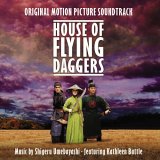 BS: Some specialized journalist and soundtrack lovers talk about a resemblance between “Lovers” them in "Shi mian mai fu" and “The Godfather” main theme. What do you think about it?
UME: That makes me very happy. Nino Rota is one of the composers whom I admire very much, and I’ve always been a Godfather fan. Unfortunately, “Lovers” has not reached its level such as Godfather. I’m willing for another challenge.
BS: Please, talk to us about
your next projects.
UME: I just finished
with an Italian film called the Mare Buio under the
movie director Roberta Torre. Now, I’m working
on a Post Production with a movie director Ronny Yu (Producer Bill
Kong) for a movie called Fearless. As for my
next year’s plan, I have plans to work with the French and the
Greek production, both relating a love story.
BS: Thank
you very much for your attention. It’s a pleasure for BSOSpirit.
Interview and Transcription made by Jose Luis Díez Chellini
Questions by Juan Antonio García Molina, Miguel del Chicca and David Doncel
|





